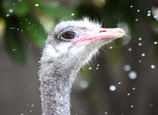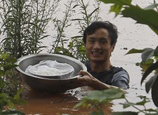
WELLINGTON, July 4 (Xinhua) -- Four New Zealand scientists left for a remote sub-Antarctic island group Thursday to prepare for the world's largest-ever mouse eradication program in order to restore the islands' ecosystem to the days before human impact.
The team from the Department of Conservation (DOC) and the University of Auckland are traveling almost 900 km from the South Island port of Lyttelton to spend a month on the Antipodes Islands nature reserve.
They said their aim was to fill gaps in knowledge about the mice and effects of their removal on some of the island's unique native species, in particular the Antipodes and Reischek's parakeets, two species that were found nowhere else in the world.
"We need to learn more about the parakeets in winter and the risk of their eating bait so that this can be minimized and managed. We will also trial holding parakeets in captivity, if this is needed during the eradication," DOC scientist Graeme Elliott said in a statement.
Other birds such as Antipodes pipit and snipe were also insects would be studied, as well as grey petrel, which was at risk of predation by mice and in decline.
Research leader and University of Auckland scientist Dr. James Russell estimated the island had up to 150 mice per hectare.
"Removing mice from Antipodes Island would be the largest mouse- only eradication in the world, and would restore the island ecosystem to its pre-sealing and whaling days prior to human impact," Russell said in the statement.
Clearing mice from the Antipodes Islands was a challenging and ambitious project that would benefit the islands' unique ecosystems, native seabirds, plants and insects, but was unlikely until 2015 at the earliest, he said.
The Antipodes Islands group is part of the sub-Antarctic islands World Heritage Area.
Mice, thought to have been introduced early last century by shipwrecks, threaten insects and plants, as well as birds eggs and young chicks on the islands.
















 Man swims in flood to deliver food for pregnant wife
Man swims in flood to deliver food for pregnant wife


![]()
